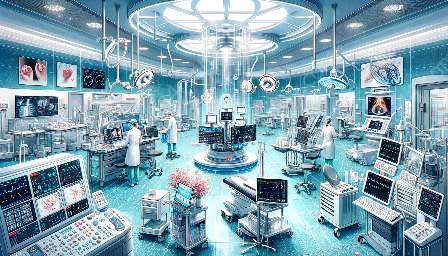Proper regulation of blood pressure is crucial for maintaining cardiovascular health. The body employs a sophisticated system to control blood pressure, involving various anatomical and physiological mechanisms. Understanding these mechanisms is essential for effectively managing blood pressure-related conditions using medical devices and interventions.
Anatomy and Physiology of Blood Pressure
Blood pressure is the force exerted by circulating blood against the walls of blood vessels. This force is vital for delivering oxygen and nutrients to tissues throughout the body. Blood pressure is influenced by the pumping action of the heart, the resistance in the blood vessels, and the volume of blood in the circulatory system.
Within the cardiovascular system, blood pressure regulation involves the interaction of multiple organs and systems. The heart, blood vessels, kidneys, and the endocrine system play integral roles in maintaining blood pressure within a normal range.
The Role of the Heart
The heart acts as a powerful pump that generates the pressure needed to propel blood throughout the body. During each heartbeat, the heart contracts (systole) to push blood into the arteries, increasing blood pressure. In contrast, during relaxation (diastole), the pressure decreases as the heart chambers refill with blood.
Vascular Resistance
Blood vessels, particularly arterioles, contribute significantly to blood pressure regulation. The diameter of the blood vessels can influence resistance to blood flow. When the vessels constrict, resistance increases, subsequently raising blood pressure. Conversely, vasodilation decreases resistance, leading to lower blood pressure.
Renal Regulation
The kidneys play a pivotal role in blood pressure control through the renin-angiotensin-aldosterone system. When blood pressure drops, specialized cells in the kidneys release an enzyme called renin. Renin triggers a cascade of events leading to the production of angiotensin II, a potent vasoconstrictor that raises blood pressure. Angiotensin II also stimulates the release of aldosterone, a hormone that promotes sodium and water retention, further elevating blood pressure.
Endocrine Regulation
Hormones such as aldosterone, antidiuretic hormone (ADH), and natriuretic peptides exert direct effects on blood volume and vascular resistance, contributing to blood pressure modulation.
Importance of Blood Pressure Regulation
Maintaining blood pressure within normal limits is critical for overall cardiovascular health. Chronic elevation of blood pressure, also known as hypertension, can lead to serious health complications, including:
- Increased risk of heart disease and stroke
- Damage to the arteries, heart, and other organs
- Kidney disease
- Vision loss
- Cognitive decline
- Metabolic syndrome
On the other hand, excessively low blood pressure, or hypotension, may result in reduced blood flow to vital organs, leading to symptoms such as dizziness, fainting, and organ damage.
Blood Pressure Monitoring and Medical Devices
Accurate measurement and monitoring of blood pressure are essential for diagnosing and managing cardiovascular conditions. A variety of medical devices are available for this purpose, including:
- Manual and automated sphygmomanometers: These devices measure blood pressure using an inflatable cuff and a gauge to detect the pressure in the arteries.
- Electronic blood pressure monitors: These automated devices provide convenient and accurate blood pressure measurements.
- Ambulatory blood pressure monitors: These portable devices record blood pressure at regular intervals over a 24-hour period, providing a comprehensive assessment of blood pressure patterns.
- Invasive blood pressure monitoring devices: These are used in critical care settings to directly measure blood pressure within the arteries.
Furthermore, advanced technologies, such as wearable blood pressure monitors and smartphone-connected devices, are revolutionizing the way blood pressure is monitored, offering greater convenience and accessibility for patients.
Conclusion
The regulation of blood pressure is a complex process involving intricate interactions among various physiological systems. Understanding the anatomy and physiology of blood pressure, along with the importance of maintaining optimal blood pressure levels, is crucial for promoting cardiovascular health. Medical devices play a significant role in monitoring blood pressure and facilitating the effective management of blood pressure-related conditions. By comprehensively addressing blood pressure regulation, healthcare professionals can contribute to the prevention and treatment of cardiovascular diseases, ultimately improving patient outcomes.


